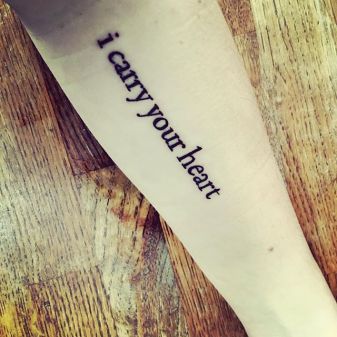
I rarely visit my sister’s grave. I feel self-conscious, like I’m stepping into a role. Should I stand forlornly in front of it? Talk to her, like someone would do in a movie scene (the kind of cheesy scene that Helen would rip the merciless piss out of, I might add)? It’s worse because it’s so public. Anyone passing through the cemetery could see me and (in my mind) scrutinise my grieving.
But the truth is, barely anyone does pass through the cemetery. It’s a shame, because it’s a beautiful space- the biggest in the UK, apparently. It has grand old trees, and well-tended flowerbeds, and acre upon acre of stones of all types. When you are standing in the middle of it, you can’t see the main roads that roar around its perimeter. In the winter, when frost evaporates from the wings of stone angels in curls of sunlit steam, you feel like you could be in Narnia.
Recently, when tinkering with my running route, I decided to take in a loop of the cemetery. I hadn’t intended to visit Helen, but once I got there, I found my feet drawn to her ‘patch’- where her neighbours are mostly other children and young people who died too soon (I think the cemetery team plan it that way, which is kind- it makes you feel less alone), with the tree in the middle that was the size of a large Christmas tree when we buried her, and now towers way above our heads.
I would have made a strange sight to anyone passing: leaning on her headstone dripping sweat and tears, my running rush sending sobs crashing through me, Sean flipping Paul blasting through my headphones. I didn’t think about what I should be doing or how I should be mourning, I just wept there for a few moments, then said ‘bye’, and ran on.
At that moment, Don’t Stop Me Now came on my playlist- one of Helen’s favourite songs, and definitely in my top five running songs. Something about the lyrics, and Freddie, and the profound knowledge that I still had life in me to run, sent me powering along- past the angels and the crumbling old graves, the newer shiny slabs and the piles of flowers for those recently gone, through the Manchester rain and the blossom petal rain. I ran my fastest 1k ever through the cemetery, Strava told me later.
A couple of days later, I stumbled across a thread in a high-brow cultural discussion group I’m a member of- oh alright, Mumsnet. It was about whether people should or should not go running in cemeteries. Many people felt that it just isn’t right, that it could offend those using the cemetery for ‘proper’ reasons, that it’s not appropriate to steam through a place of quiet reflection in neon lycra.
It puzzled me, that anyone would find it disrespectful or offensive.
I mean, I understand that there are limits. I wouldn’t advocate having a Parkrun in a cemetery (actually, I think it would be joyful, but I appreciate that somebody trying to have a quiet graveside moment might not appreciate 400 pairs of trainers thumping enthusiastically by). I wouldn’t do many other sorts of exercise there- nobody needs to hear me grunting through ten sets of burpees while they are trying to mourn. And of course, if I saw a burial taking place up ahead, I would make a discreet u-turn, just as I would stop my car to let a funeral procession pass.
But I do think we should bring these little-used spaces into our everyday lives more- not just because they are green spaces, and god knows that in our cities these are precious. But because we should stop pushing away death, as if isn’t part of life.
What do we do with our dead- bury them away and only engage with them when we make the sad little pilgrimage to stand awkwardly at a grave? I loved dropping in on my sister in an impromptu way- I can’t do that in ‘real life’, but I loved that she was part of my real life, as I ran that day. I’ve now incorporated the cemetery into my regular route, and sometimes I’ll stop by her grave for a minute (I’ll do anything for a breather), and sometimes I’ll wave as I jog by, or just glance over at ‘her’ tree with its wind chimes jangling.
I think we should run, and walk, and cycle in cemeteries- hell, let’s do yoga in cemeteries. And I think kids should go on school trips and nature walks in cemeteries. I think we should make them into places filled with more than memories and silence and ne’er-do-wells doing inappropriate things. More than spooky Halloween places.
And you know… there’s something about running in particular. If you run, you’ll know that it just feels human, in a way you can’t explain. On paper (and sometimes in reality) it’s crap: monotonous, knackering and torturous. But it feels elemental and instinctual. I’m sure that other people, who have done actual academic research and stuff, can back me up on this, but frankly I’m too tired to google.
As Bruce (king of my running playlist) sang, we are born to run. And we’re born to die, too. So at the risk of sounding like an absolute arse of a running bore, when I run, I’m respecting what it is to be human. And when I run in the cemetery, I’m respecting that it’s also human to die. Running in a graveyard seems to me, actually, like the most natural thing to do.
So if you’re walking by the largest cemetery in Britain and you see a woman with a beetroot face waving at a gravestone and perhaps weeping, or perhaps singing along to Dizzee Rascal- don’t worry, I’m fine. Come on in, instead. It’s actually rather lovely.

